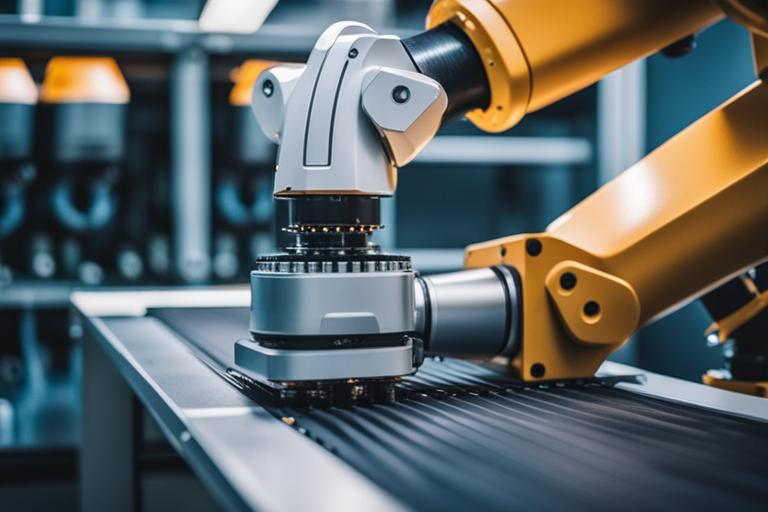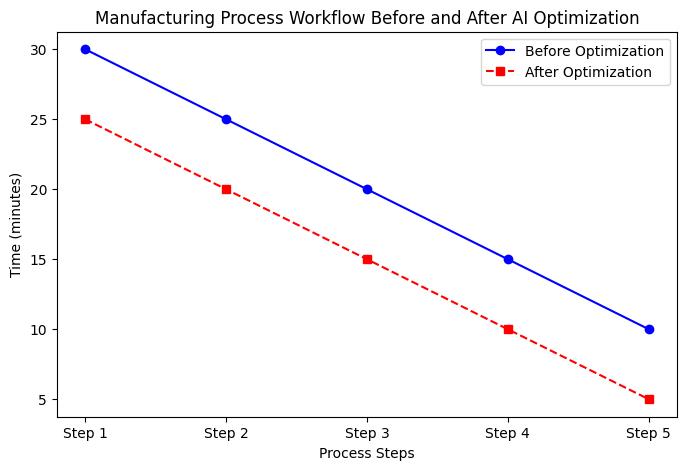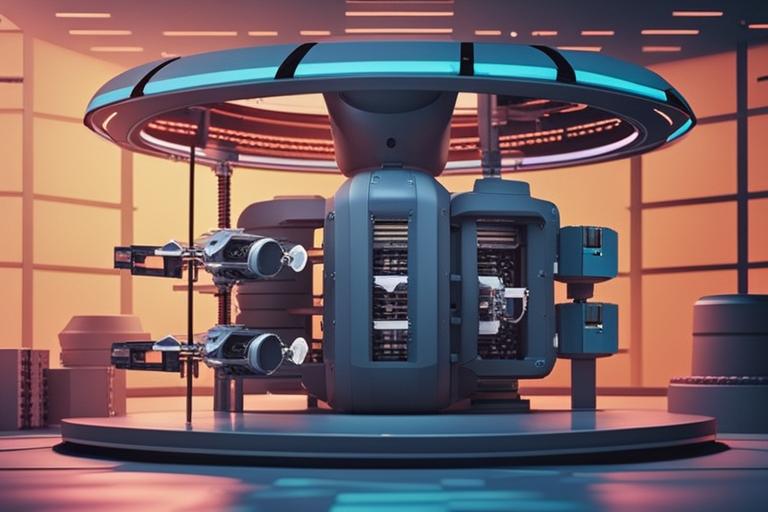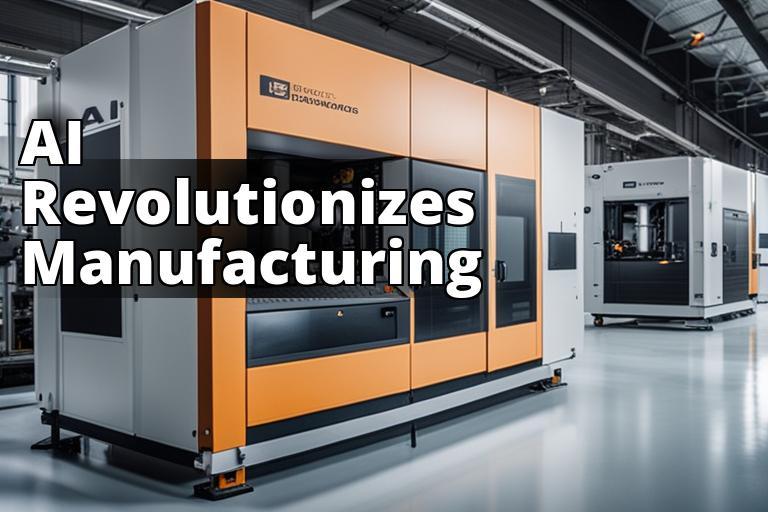How Can AI Software Aid in Optimizing Manufacturing Processes?
In the rapidly evolving manufacturing landscape, AI software has emerged as a game-changer, revolutionizing traditional processes and driving operational excellence. AI, or artificial intelligence, encompasses a range of technologies that enable machines to simulate human intelligence, make informed decisions, and perform tasks that typically require human intervention. The application of AI software in manufacturing is poised to transform the industry by optimizing processes, enhancing efficiency, and minimizing operational costs.
Learn about AI Software in Manufacturing Optimization
By reading this article, you will learn:
– How AI software aids in data analysis and predictive maintenance
– How AI software improves quality control and defect detection
– How AI software helps in supply chain management optimization
AI software plays a pivotal role in manufacturing optimization by leveraging advanced algorithms to analyze vast datasets, identify patterns, and make data-driven decisions. This empowers manufacturers to streamline operations, reduce waste, and enhance overall productivity. By harnessing the power of AI, manufacturers can gain valuable insights into their processes, enabling them to make informed decisions and drive continuous improvement.

Understanding the Role of AI Software in Manufacturing Optimization
The integration of AI software in manufacturing is instrumental in enhancing operational efficiency across various facets of the production cycle. From predictive maintenance and quality control to supply chain management and process automation, AI software empowers manufacturers to optimize their operations, minimize downtime, and deliver high-quality products with precision and consistency.
Importance of AI Software in Enhancing Operational Efficiency
The optimization of manufacturing processes through AI software is underpinned by several key factors, including data analysis, predictive maintenance, quality control, supply chain management, process automation, energy efficiency, human-machine collaboration, and decision-making support. By addressing these critical aspects, AI software enables manufacturers to unlock new levels of efficiency, sustainability, and competitiveness.
Data Analysis and Predictive Maintenance with AI
AI software facilitates advanced data analysis in manufacturing by processing large volumes of operational data to uncover valuable insights and trends. By identifying correlations and anomalies within the data, manufacturers can make proactive decisions to optimize processes, improve resource utilization, and drive continuous improvement. Predictive maintenance, powered by AI software, enables manufacturers to forecast equipment failures and proactively schedule maintenance activities to prevent unplanned downtime. By leveraging machine learning algorithms, manufacturers can monitor equipment performance in real-time, detect early warning signs of potential issues, and execute targeted maintenance interventions, thereby minimizing production disruptions and optimizing asset utilization.
| Data Analysis with AI Software | Predictive Maintenance with AI Software |
|---|---|
| Processes large datasets | Forecasts equipment failures |
| Identifies insights and trends | Proactively schedules maintenance |
| Improves resource utilization | Minimizes production disruptions |

Quality Control and Defect Detection Using AI Software
AI-powered systems enable real-time defect detection and quality control by leveraging computer vision and machine learning algorithms to inspect products for imperfections and deviations from quality standards. This capability empowers manufacturers to identify defects at an early stage, minimize production of non-conforming products, and uphold stringent quality standards. The integration of AI software in quality control processes ensures the consistent delivery of high-quality products by enabling automated inspection, precision measurement, and anomaly detection. By leveraging AI-driven quality control, manufacturers can enhance product quality, mitigate defects, and bolster customer satisfaction. AI-enabled quality control mechanisms contribute to waste reduction by minimizing the production of defective or substandard products. This not only optimizes resource utilization but also aligns with sustainable manufacturing practices, fostering environmental conservation and operational efficiency.
Supply Chain Management Optimization with AI Software
AI software optimizes inventory management efficiency by forecasting demand, optimizing stock levels, and facilitating streamlined inventory replenishment. By leveraging AI-driven insights, manufacturers can minimize inventory holding costs, prevent stockouts, and enhance supply chain resilience. AI-driven demand forecasting empowers manufacturers to anticipate market trends, adapt production schedules, and optimize inventory levels to meet customer demand. By harnessing AI software for demand forecasting, manufacturers can enhance planning accuracy, minimize stock obsolescence, and improve overall supply chain efficiency. AI software solutions streamline logistics operations by optimizing route planning, load optimization, and delivery scheduling. By harnessing AI-driven logistics optimization, manufacturers can minimize transportation costs, reduce delivery lead times, and enhance overall supply chain performance.

Process Optimization and Automation through AI
AI algorithms analyze production processes to identify bottlenecks, inefficiencies, and areas for improvement. By leveraging AI insights, manufacturers can optimize workflows, reallocate resources, and streamline production processes to enhance overall operational efficiency. AI software streamlines workflows by automating repetitive tasks, optimizing task allocation, and facilitating seamless coordination between man and machine. This enables manufacturers to achieve greater process efficiency, minimize lead times, and adapt to dynamic production demands. The automation of repetitive tasks through AI software liberates human resources from mundane activities, allowing them to focus on higher-value tasks that require creativity, problem-solving, and strategic decision-making. This boosts productivity and fosters a work environment conducive to innovation and continuous improvement.

Energy Efficiency and Sustainability with AI Technology
AI technology monitors energy consumption across manufacturing facilities, identifies opportunities for energy savings, and recommends energy-efficient practices. By leveraging AI for energy monitoring, manufacturers can reduce operational costs, minimize environmental impact, and align with sustainable energy practices. AI technology optimizes resource utilization by analyzing production processes, identifying inefficiencies, and recommending resource-efficient practices. This enables manufacturers to minimize waste, conserve resources, and drive sustainable manufacturing practices. The implementation of sustainable practices through AI software in manufacturing aligns with environmental conservation efforts, regulatory compliance, and corporate social responsibility. By integrating AI-driven sustainability initiatives, manufacturers can reduce their carbon footprint, enhance brand reputation, and contribute to a greener, more sustainable future.
Human-Machine Collaboration and Decision-making in Manufacturing
AI software provides real-time insights and recommendations to support decision-making on the manufacturing floor, enabling operators to make informed choices and take corrective actions promptly. This real-time collaboration between humans and machines enhances operational agility and responsiveness. The collaboration between humans and AI-powered systems enhances operational performance by leveraging the strengths of both entities. By working in tandem, humans and machines can optimize processes, mitigate risks, and drive continuous improvement in manufacturing operations. AI technology enhances decision-making on the factory floor by providing operators with actionable insights, predictive analytics, and prescriptive recommendations. This empowers manufacturing teams to make informed decisions that drive operational efficiency, quality, and customer satisfaction.
Case Studies and Success Stories of AI Software Implementation
Several leading manufacturers have successfully implemented AI solutions to optimize their manufacturing processes, drive efficiency gains, and achieve competitive advantages. These success stories demonstrate the transformative impact of AI software in enhancing operational performance and delivering tangible business outcomes. The implementation of AI software in manufacturing has yielded tangible benefits, including improved productivity, reduced downtime, enhanced quality, optimized resource utilization, and streamlined supply chain operations. These outcomes underscore the value of AI in driving operational excellence and business success. By showcasing successful implementation of AI solutions in optimizing processes, manufacturers can inspire others to embrace AI technology, leverage its potential, and embark on a journey of digital transformation to achieve sustainable competitive advantages.
Real-life Impact of AI Software Implementation: A Case Study
From Struggling with Downtime to Improved Efficiency
When John, the operations manager at a manufacturing plant, implemented AI software for predictive maintenance, the results were remarkable. The AI software analyzed equipment data to predict potential failures, allowing for proactive maintenance. As a result, the plant saw a significant reduction in unplanned downtime, from an average of 15 hours per month to just 5 hours.
This case study showcases how AI software can revolutionize manufacturing processes by not only reducing downtime but also improving overall operational efficiency. John’s experience highlights the tangible benefits of AI implementation, providing a real-life example of the transformative impact of AI in manufacturing.
Challenges and Considerations in Implementing AI Software in Manufacturing
The integration of AI software in manufacturing is accompanied by challenges such as data complexity, interoperability, and change management. Overcoming these challenges requires a strategic approach, robust change management practices, and a clear roadmap for AI integration. AI implementations in manufacturing necessitate robust data security measures to safeguard sensitive information, protect intellectual property, and ensure compliance with data privacy regulations. Addressing data security concerns is paramount to fostering trust and confidence in AI-driven manufacturing systems. The integration of AI in manufacturing necessitates upskilling the workforce to leverage AI tools effectively and adapt to the evolving digital landscape. Additionally, ethical considerations surrounding AI implementation, such as transparency, accountability, and bias mitigation, require careful deliberation to ensure responsible and ethical use of AI technology.

Future Trends and Opportunities in AI Software for Manufacturing
The landscape of AI software in manufacturing is continually evolving, with advancements in machine learning, robotics, and cognitive automation shaping the future of manufacturing optimization. Manufacturers must stay abreast of these developments to capitalize on emerging opportunities and stay ahead of the competition. Emerging technologies such as edge computing, digital twins, and autonomous systems offer new avenues for AI application in manufacturing, presenting opportunities to drive further efficiency gains, predictive capabilities, and operational resilience. When inquired in a recent industry webinar about the impact of AI in supply chain management, supply chain experts emphasized the transformative potential of AI in improving inventory management and demand forecasting accuracy, thereby driving supply chain optimization.
In conclusion, the integration of AI software in manufacturing holds immense potential to revolutionize traditional processes, drive efficiency gains, and propel the industry toward sustainable and competitive growth. As manufacturers embrace AI-driven optimization, they are well-positioned to unlock new levels of operational excellence and deliver superior value to customers and stakeholders.
FAQ
Who can benefit from using AI software in manufacturing processes?
Manufacturers across various industries can benefit from using AI software to optimize their processes.
What are the main ways AI software can optimize manufacturing processes?
AI software can optimize manufacturing processes by predicting equipment failures and streamlining production schedules.
How does AI software analyze data to improve manufacturing processes?
AI software analyzes large volumes of data to identify patterns and make real-time adjustments to optimize manufacturing processes.
What if my current manufacturing setup is not compatible with AI software?
Many AI software solutions are designed to integrate with existing manufacturing systems, offering compatibility and seamless implementation.
How can AI software improve productivity and efficiency in manufacturing?
AI software can improve productivity and efficiency in manufacturing by automating repetitive tasks and identifying opportunities for process optimization.
What if I don’t have the technical expertise to implement AI software?
Many AI software providers offer support and training to help manufacturers implement and utilize the technology effectively.
The author of this article, Joshua Mitchell, is a seasoned expert in the field of industrial engineering and artificial intelligence (AI) technology. With a Ph.D. in Industrial Engineering from a prestigious research university, Joshua Mitchell has dedicated over a decade to researching and implementing AI solutions in manufacturing processes. Their extensive experience includes leading a research team that collaborated with major manufacturing companies to optimize their production lines using AI software.
Joshua Mitchell has also published numerous peer-reviewed articles in reputable journals and has presented their findings at international conferences on AI in manufacturing. Their work is recognized for its innovative approach to data analysis and predictive maintenance using AI, contributing to the improvement of operational efficiency and sustainability in manufacturing.
Furthermore, Joshua Mitchell has conducted in-depth case studies and success stories of AI software implementation in manufacturing, providing valuable insights into the real-life impact of AI technology. With a passion for revolutionizing manufacturing processes, Joshua Mitchell is committed to sharing their expertise and knowledge to drive the industry forward.

Leave a Reply